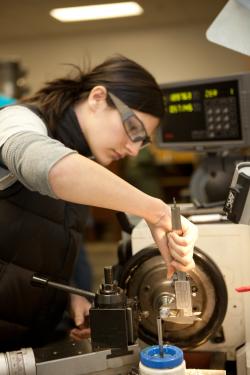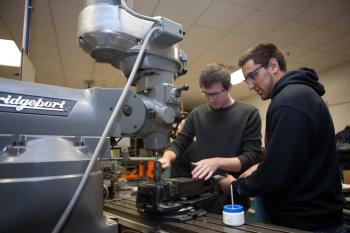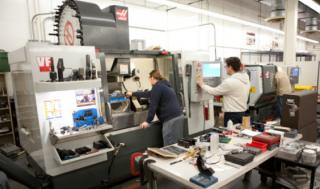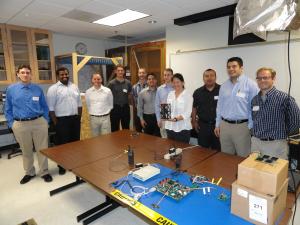Students: Refurbished machine shop gives students hands-on skills
 George Youssef, an assistant professor of mechanical engineering, was walking past the college’s aging machine shop last year, when an idea he’d been mulling over crystallized in his head. Why not upgrade the shop to teach engineers machining? Youssef, who teaches machine design, had found that when students arrived in his class, they couldn’t readily translate the designs they created in CAD to real life. Giving them hands-on machining skills would help them understand the capabilities and limitations of the machines, so when they put their ideas on paper, they would be able to gauge whether or not they were feasible.
George Youssef, an assistant professor of mechanical engineering, was walking past the college’s aging machine shop last year, when an idea he’d been mulling over crystallized in his head. Why not upgrade the shop to teach engineers machining? Youssef, who teaches machine design, had found that when students arrived in his class, they couldn’t readily translate the designs they created in CAD to real life. Giving them hands-on machining skills would help them understand the capabilities and limitations of the machines, so when they put their ideas on paper, they would be able to gauge whether or not they were feasible.
He shared his idea with associate professor of mechanical engineering Robert Ryan, who was equally enthusiastic, and the two submitted a proposal for university funds to refurbish the machine shop and engage students through a series of workshops. They received the grant, and it soon became a collaboration that extended far beyond the pair. Department chair Hamid Johari agreed to let the department manage the funds, relieving Youssef and Ryan of that time-consuming burden. To stretch the money to the maximum, Stewart Prince, professor of mechanical engineering, donated two old machines from his lab. Through the intervention of Dean S. K. Ramesh, the college was able to obtain new equipment at cost from Ganesh Machinery, a company owned by an alumnus of CECS. Emil Henry, the college’s manager of technical services, helped reorganize and upgrade the machine shop, as well as plan the workshops with Youssef and Ryan.
With the machine shop now refurbished, the team rolled out a three-day machining workshop in which students fabricate a C-clamp. Participants first learn about safety, and machinist Roger Arias demonstrates the machines and oversees the workshops. The students go on to make the parts for the clamp, and at the end of the workshop, they take an online quiz; if they pass, they receive a certificate of completion that allows them to use the shop.
 “The fun part is that we can’t keep them away,” Youssef says. “We were thinking we were only going to train 50 students, but the first year we had 87. And just by having the machine shop, between the workshop and projects, students stayed on campus an additional 2,000 hours in the 2012-13 academic year.”
“The fun part is that we can’t keep them away,” Youssef says. “We were thinking we were only going to train 50 students, but the first year we had 87. And just by having the machine shop, between the workshop and projects, students stayed on campus an additional 2,000 hours in the 2012-13 academic year.”
The team received the grant again for the current year, so the workshops will continue, and Youssef estimates that they will train 100 students in 2013-14. For the long term, however, he is interested in identifying additional sources of funding that will enable the college to continue offering the workshops and producing graduates who have hands-on experience with machining, which will enhance their engineering expertise and job prospects.
A message from the Dean
February 6, 2014Industry partnerships – HAAS
February 6, 2014Industry Partnerships – Jet Propulsion Laboratory
February 6, 2014
Leave a reply Cancel reply
-
CSUN hosts regional competition for budding high school civil engineers
February 20, 2015 -
Steel Bridge
November 30, 2012



